Caffeine as an Ergogenic Aid: A Comprehensive Analysis of Research
VerifiedAdded on 2022/09/03
|6
|1417
|45
Essay
AI Summary
This essay provides a comprehensive analysis of caffeine as an ergogenic aid, examining its impact on athletic performance. It begins with an introduction to ergogenic aids, defining them as substances that enhance physical or mental performance during exercise. The essay then focuses on caffeine, a naturally occurring stimulant found in various plants, and its effects on the body. It explores how caffeine interacts with the central nervous system, reducing fatigue and increasing alertness by blocking adenosine receptors. The essay reviews research on caffeine's effects on aerobic and anaerobic exercise, including its impact on muscle strength, power, and endurance. It discusses the various sources of caffeine, including coffee, tea, chocolate, and energy drinks, and the effective dosage for healthy individuals. The essay concludes by summarizing caffeine's benefits, such as improved mental sharpness and fat burning, while also acknowledging potential side effects of excessive consumption, such as bone thinning and muscle twitching.
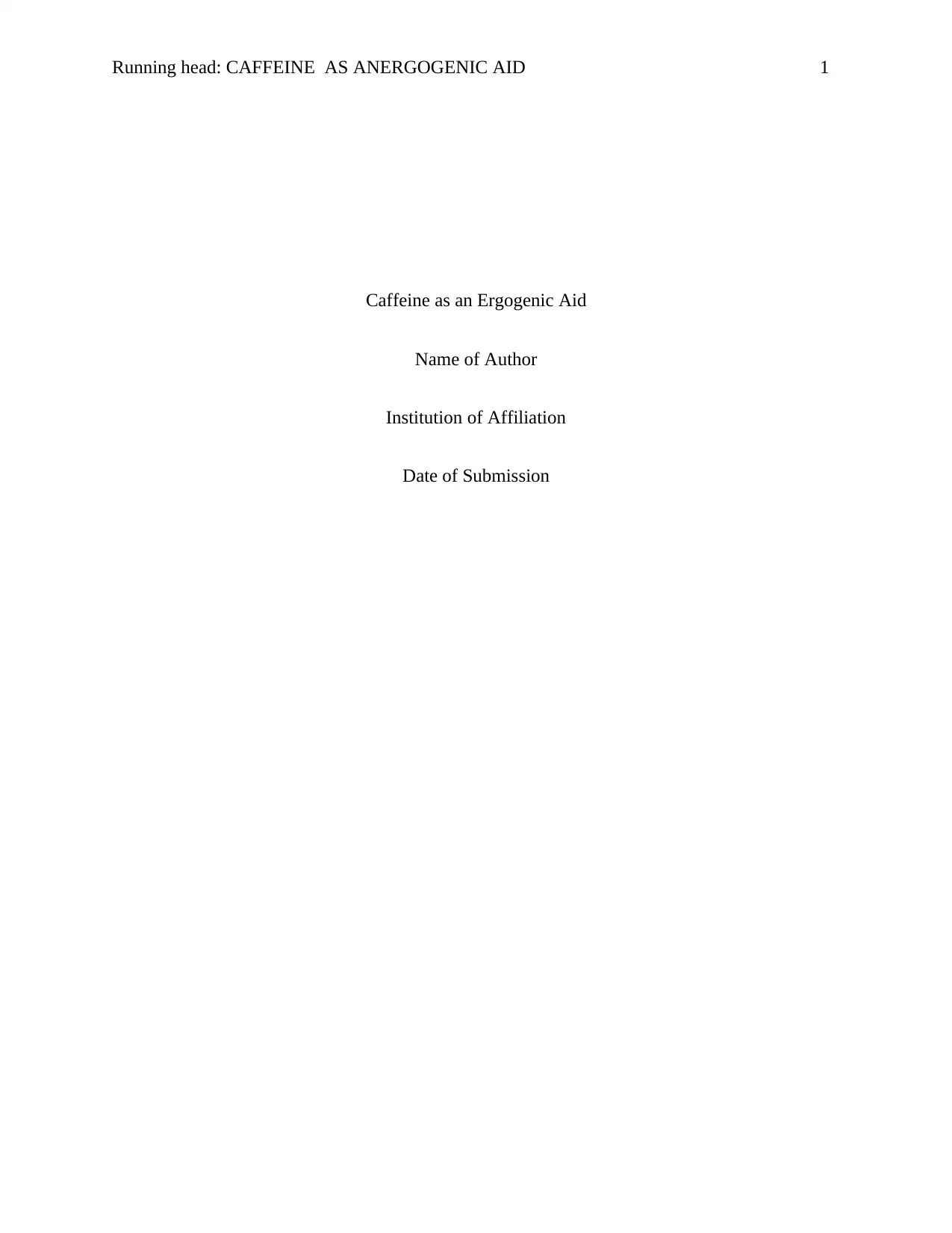
Running head: CAFFEINE AS ANERGOGENIC AID 1
Caffeine as an Ergogenic Aid
Name of Author
Institution of Affiliation
Date of Submission
Caffeine as an Ergogenic Aid
Name of Author
Institution of Affiliation
Date of Submission
Paraphrase This Document
Need a fresh take? Get an instant paraphrase of this document with our AI Paraphraser
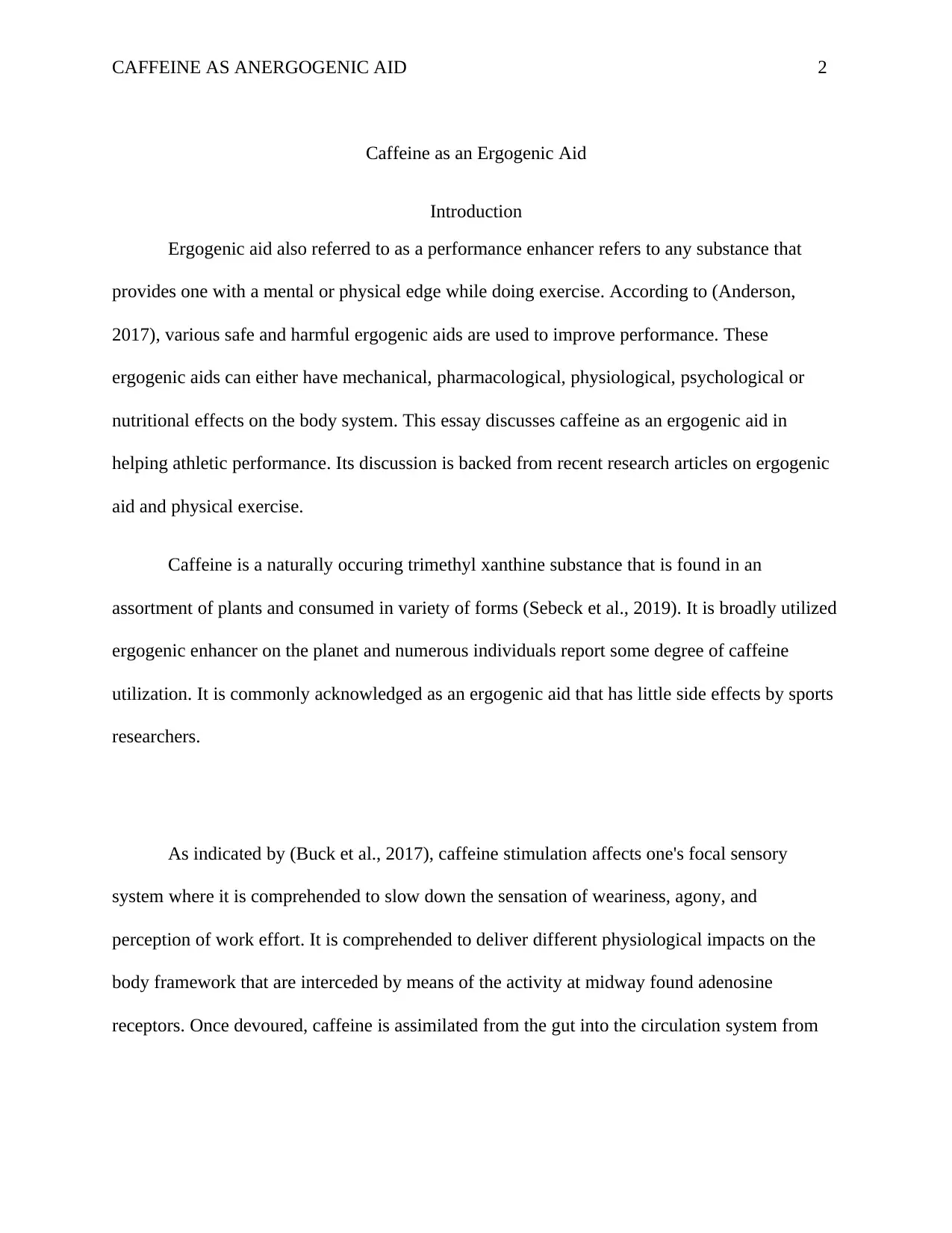
CAFFEINE AS ANERGOGENIC AID 2
Caffeine as an Ergogenic Aid
Introduction
Ergogenic aid also referred to as a performance enhancer refers to any substance that
provides one with a mental or physical edge while doing exercise. According to (Anderson,
2017), various safe and harmful ergogenic aids are used to improve performance. These
ergogenic aids can either have mechanical, pharmacological, physiological, psychological or
nutritional effects on the body system. This essay discusses caffeine as an ergogenic aid in
helping athletic performance. Its discussion is backed from recent research articles on ergogenic
aid and physical exercise.
Caffeine is a naturally occuring trimethyl xanthine substance that is found in an
assortment of plants and consumed in variety of forms (Sebeck et al., 2019). It is broadly utilized
ergogenic enhancer on the planet and numerous individuals report some degree of caffeine
utilization. It is commonly acknowledged as an ergogenic aid that has little side effects by sports
researchers.
As indicated by (Buck et al., 2017), caffeine stimulation affects one's focal sensory
system where it is comprehended to slow down the sensation of weariness, agony, and
perception of work effort. It is comprehended to deliver different physiological impacts on the
body framework that are interceded by means of the activity at midway found adenosine
receptors. Once devoured, caffeine is assimilated from the gut into the circulation system from
Caffeine as an Ergogenic Aid
Introduction
Ergogenic aid also referred to as a performance enhancer refers to any substance that
provides one with a mental or physical edge while doing exercise. According to (Anderson,
2017), various safe and harmful ergogenic aids are used to improve performance. These
ergogenic aids can either have mechanical, pharmacological, physiological, psychological or
nutritional effects on the body system. This essay discusses caffeine as an ergogenic aid in
helping athletic performance. Its discussion is backed from recent research articles on ergogenic
aid and physical exercise.
Caffeine is a naturally occuring trimethyl xanthine substance that is found in an
assortment of plants and consumed in variety of forms (Sebeck et al., 2019). It is broadly utilized
ergogenic enhancer on the planet and numerous individuals report some degree of caffeine
utilization. It is commonly acknowledged as an ergogenic aid that has little side effects by sports
researchers.
As indicated by (Buck et al., 2017), caffeine stimulation affects one's focal sensory
system where it is comprehended to slow down the sensation of weariness, agony, and
perception of work effort. It is comprehended to deliver different physiological impacts on the
body framework that are interceded by means of the activity at midway found adenosine
receptors. Once devoured, caffeine is assimilated from the gut into the circulation system from
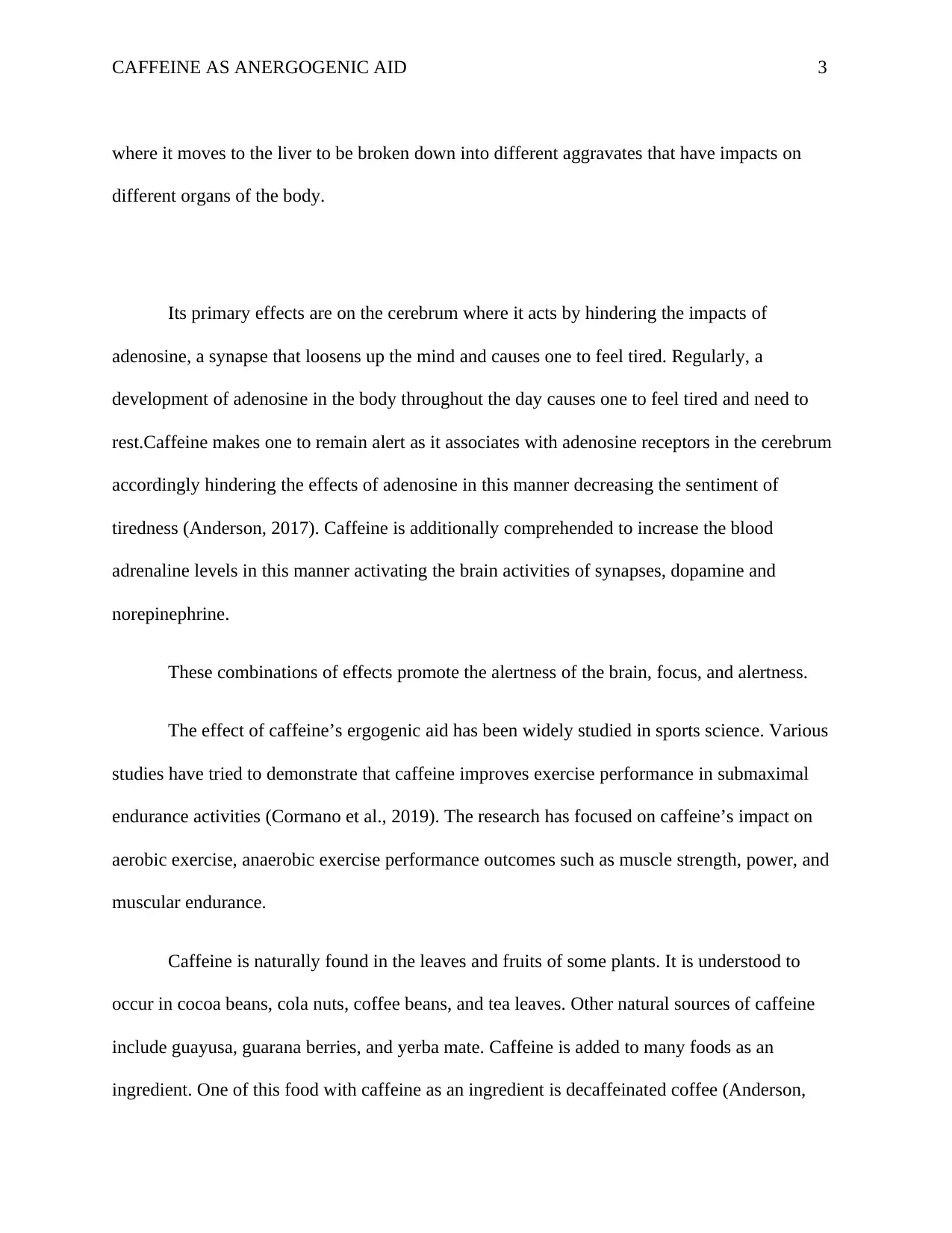
CAFFEINE AS ANERGOGENIC AID 3
where it moves to the liver to be broken down into different aggravates that have impacts on
different organs of the body.
Its primary effects are on the cerebrum where it acts by hindering the impacts of
adenosine, a synapse that loosens up the mind and causes one to feel tired. Regularly, a
development of adenosine in the body throughout the day causes one to feel tired and need to
rest.Caffeine makes one to remain alert as it associates with adenosine receptors in the cerebrum
accordingly hindering the effects of adenosine in this manner decreasing the sentiment of
tiredness (Anderson, 2017). Caffeine is additionally comprehended to increase the blood
adrenaline levels in this manner activating the brain activities of synapses, dopamine and
norepinephrine.
These combinations of effects promote the alertness of the brain, focus, and alertness.
The effect of caffeine’s ergogenic aid has been widely studied in sports science. Various
studies have tried to demonstrate that caffeine improves exercise performance in submaximal
endurance activities (Cormano et al., 2019). The research has focused on caffeine’s impact on
aerobic exercise, anaerobic exercise performance outcomes such as muscle strength, power, and
muscular endurance.
Caffeine is naturally found in the leaves and fruits of some plants. It is understood to
occur in cocoa beans, cola nuts, coffee beans, and tea leaves. Other natural sources of caffeine
include guayusa, guarana berries, and yerba mate. Caffeine is added to many foods as an
ingredient. One of this food with caffeine as an ingredient is decaffeinated coffee (Anderson,
where it moves to the liver to be broken down into different aggravates that have impacts on
different organs of the body.
Its primary effects are on the cerebrum where it acts by hindering the impacts of
adenosine, a synapse that loosens up the mind and causes one to feel tired. Regularly, a
development of adenosine in the body throughout the day causes one to feel tired and need to
rest.Caffeine makes one to remain alert as it associates with adenosine receptors in the cerebrum
accordingly hindering the effects of adenosine in this manner decreasing the sentiment of
tiredness (Anderson, 2017). Caffeine is additionally comprehended to increase the blood
adrenaline levels in this manner activating the brain activities of synapses, dopamine and
norepinephrine.
These combinations of effects promote the alertness of the brain, focus, and alertness.
The effect of caffeine’s ergogenic aid has been widely studied in sports science. Various
studies have tried to demonstrate that caffeine improves exercise performance in submaximal
endurance activities (Cormano et al., 2019). The research has focused on caffeine’s impact on
aerobic exercise, anaerobic exercise performance outcomes such as muscle strength, power, and
muscular endurance.
Caffeine is naturally found in the leaves and fruits of some plants. It is understood to
occur in cocoa beans, cola nuts, coffee beans, and tea leaves. Other natural sources of caffeine
include guayusa, guarana berries, and yerba mate. Caffeine is added to many foods as an
ingredient. One of this food with caffeine as an ingredient is decaffeinated coffee (Anderson,
⊘ This is a preview!⊘
Do you want full access?
Subscribe today to unlock all pages.

Trusted by 1+ million students worldwide
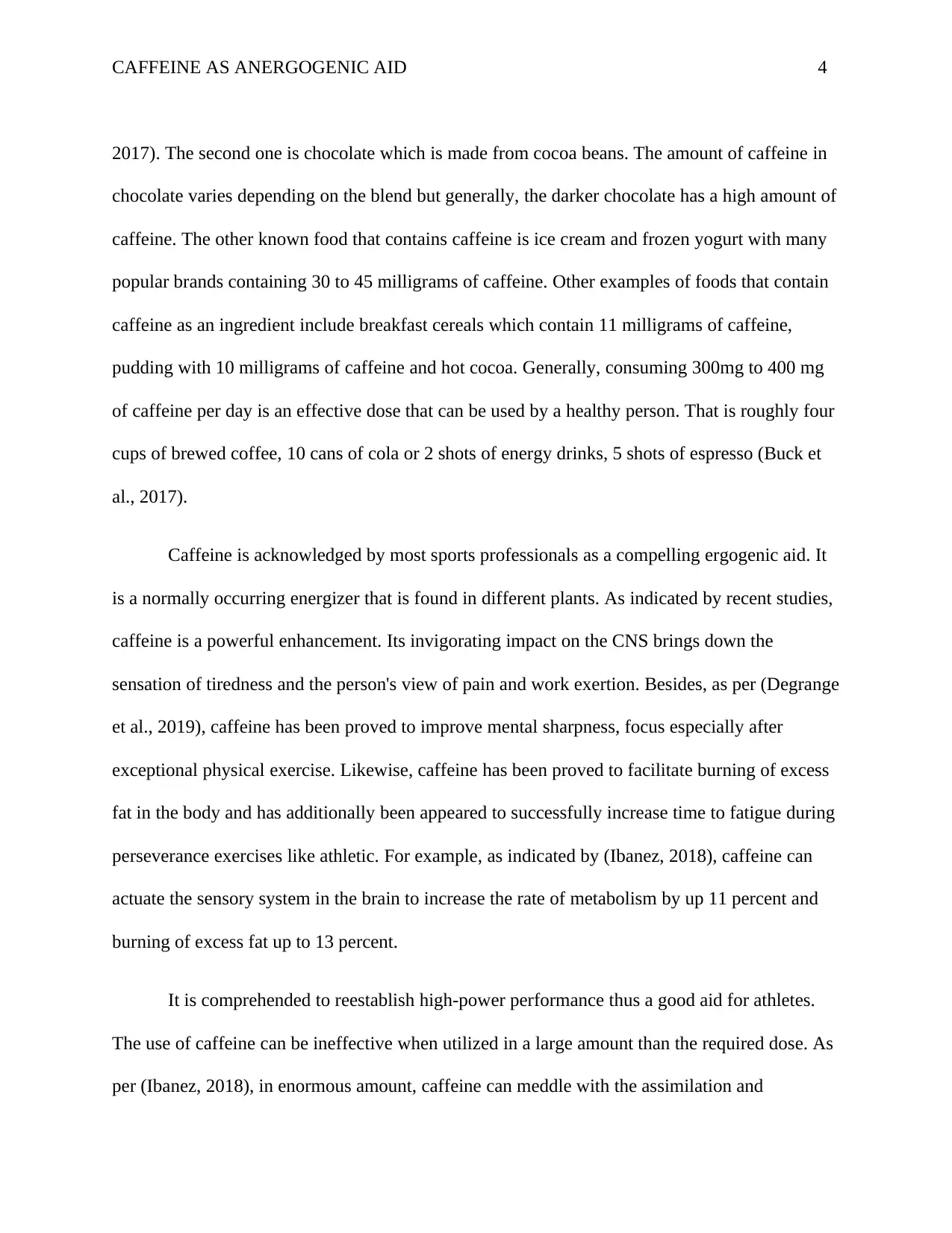
CAFFEINE AS ANERGOGENIC AID 4
2017). The second one is chocolate which is made from cocoa beans. The amount of caffeine in
chocolate varies depending on the blend but generally, the darker chocolate has a high amount of
caffeine. The other known food that contains caffeine is ice cream and frozen yogurt with many
popular brands containing 30 to 45 milligrams of caffeine. Other examples of foods that contain
caffeine as an ingredient include breakfast cereals which contain 11 milligrams of caffeine,
pudding with 10 milligrams of caffeine and hot cocoa. Generally, consuming 300mg to 400 mg
of caffeine per day is an effective dose that can be used by a healthy person. That is roughly four
cups of brewed coffee, 10 cans of cola or 2 shots of energy drinks, 5 shots of espresso (Buck et
al., 2017).
Caffeine is acknowledged by most sports professionals as a compelling ergogenic aid. It
is a normally occurring energizer that is found in different plants. As indicated by recent studies,
caffeine is a powerful enhancement. Its invigorating impact on the CNS brings down the
sensation of tiredness and the person's view of pain and work exertion. Besides, as per (Degrange
et al., 2019), caffeine has been proved to improve mental sharpness, focus especially after
exceptional physical exercise. Likewise, caffeine has been proved to facilitate burning of excess
fat in the body and has additionally been appeared to successfully increase time to fatigue during
perseverance exercises like athletic. For example, as indicated by (Ibanez, 2018), caffeine can
actuate the sensory system in the brain to increase the rate of metabolism by up 11 percent and
burning of excess fat up to 13 percent.
It is comprehended to reestablish high-power performance thus a good aid for athletes.
The use of caffeine can be ineffective when utilized in a large amount than the required dose. As
per (Ibanez, 2018), in enormous amount, caffeine can meddle with the assimilation and
2017). The second one is chocolate which is made from cocoa beans. The amount of caffeine in
chocolate varies depending on the blend but generally, the darker chocolate has a high amount of
caffeine. The other known food that contains caffeine is ice cream and frozen yogurt with many
popular brands containing 30 to 45 milligrams of caffeine. Other examples of foods that contain
caffeine as an ingredient include breakfast cereals which contain 11 milligrams of caffeine,
pudding with 10 milligrams of caffeine and hot cocoa. Generally, consuming 300mg to 400 mg
of caffeine per day is an effective dose that can be used by a healthy person. That is roughly four
cups of brewed coffee, 10 cans of cola or 2 shots of energy drinks, 5 shots of espresso (Buck et
al., 2017).
Caffeine is acknowledged by most sports professionals as a compelling ergogenic aid. It
is a normally occurring energizer that is found in different plants. As indicated by recent studies,
caffeine is a powerful enhancement. Its invigorating impact on the CNS brings down the
sensation of tiredness and the person's view of pain and work exertion. Besides, as per (Degrange
et al., 2019), caffeine has been proved to improve mental sharpness, focus especially after
exceptional physical exercise. Likewise, caffeine has been proved to facilitate burning of excess
fat in the body and has additionally been appeared to successfully increase time to fatigue during
perseverance exercises like athletic. For example, as indicated by (Ibanez, 2018), caffeine can
actuate the sensory system in the brain to increase the rate of metabolism by up 11 percent and
burning of excess fat up to 13 percent.
It is comprehended to reestablish high-power performance thus a good aid for athletes.
The use of caffeine can be ineffective when utilized in a large amount than the required dose. As
per (Ibanez, 2018), in enormous amount, caffeine can meddle with the assimilation and
Paraphrase This Document
Need a fresh take? Get an instant paraphrase of this document with our AI Paraphraser
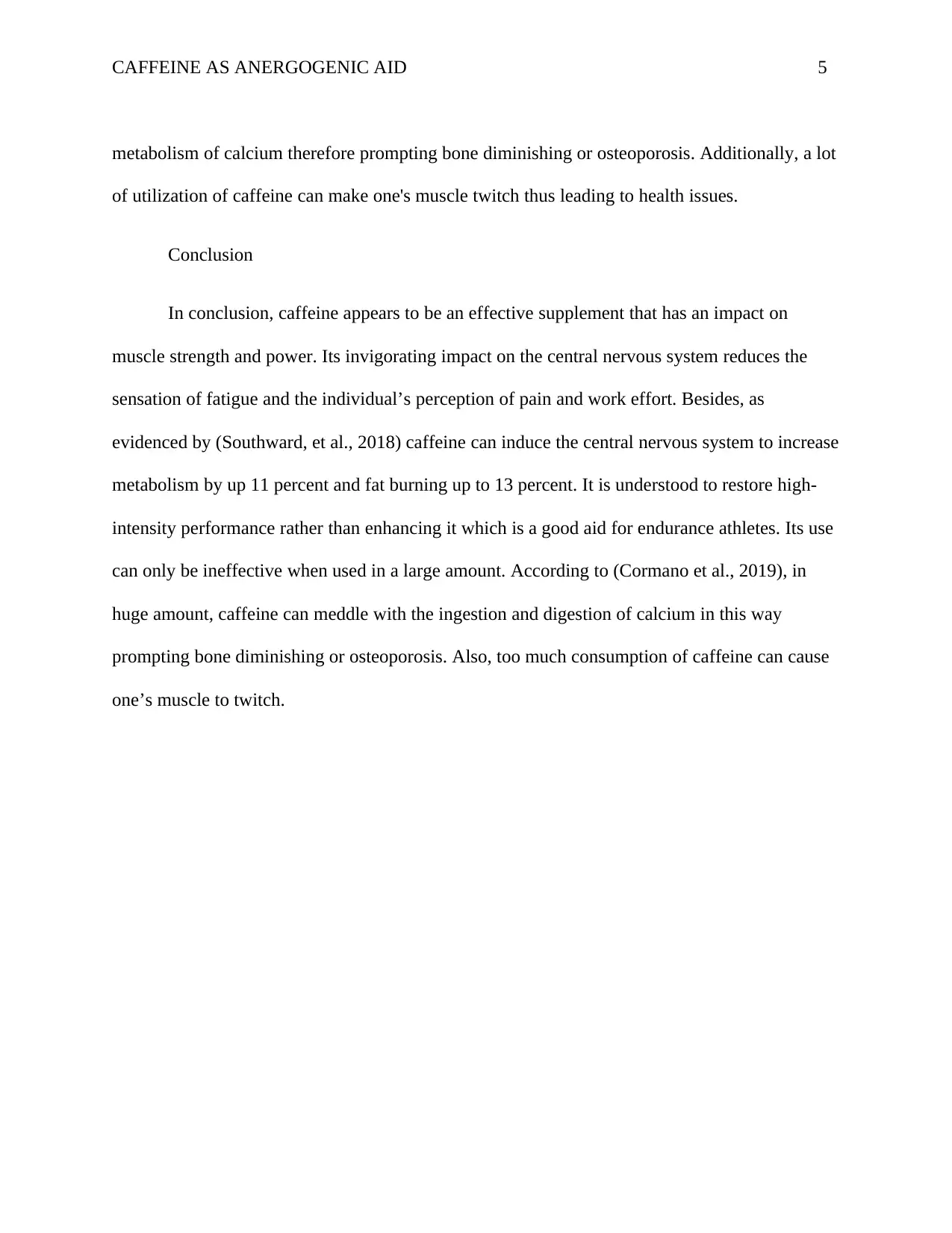
CAFFEINE AS ANERGOGENIC AID 5
metabolism of calcium therefore prompting bone diminishing or osteoporosis. Additionally, a lot
of utilization of caffeine can make one's muscle twitch thus leading to health issues.
Conclusion
In conclusion, caffeine appears to be an effective supplement that has an impact on
muscle strength and power. Its invigorating impact on the central nervous system reduces the
sensation of fatigue and the individual’s perception of pain and work effort. Besides, as
evidenced by (Southward, et al., 2018) caffeine can induce the central nervous system to increase
metabolism by up 11 percent and fat burning up to 13 percent. It is understood to restore high-
intensity performance rather than enhancing it which is a good aid for endurance athletes. Its use
can only be ineffective when used in a large amount. According to (Cormano et al., 2019), in
huge amount, caffeine can meddle with the ingestion and digestion of calcium in this way
prompting bone diminishing or osteoporosis. Also, too much consumption of caffeine can cause
one’s muscle to twitch.
metabolism of calcium therefore prompting bone diminishing or osteoporosis. Additionally, a lot
of utilization of caffeine can make one's muscle twitch thus leading to health issues.
Conclusion
In conclusion, caffeine appears to be an effective supplement that has an impact on
muscle strength and power. Its invigorating impact on the central nervous system reduces the
sensation of fatigue and the individual’s perception of pain and work effort. Besides, as
evidenced by (Southward, et al., 2018) caffeine can induce the central nervous system to increase
metabolism by up 11 percent and fat burning up to 13 percent. It is understood to restore high-
intensity performance rather than enhancing it which is a good aid for endurance athletes. Its use
can only be ineffective when used in a large amount. According to (Cormano et al., 2019), in
huge amount, caffeine can meddle with the ingestion and digestion of calcium in this way
prompting bone diminishing or osteoporosis. Also, too much consumption of caffeine can cause
one’s muscle to twitch.
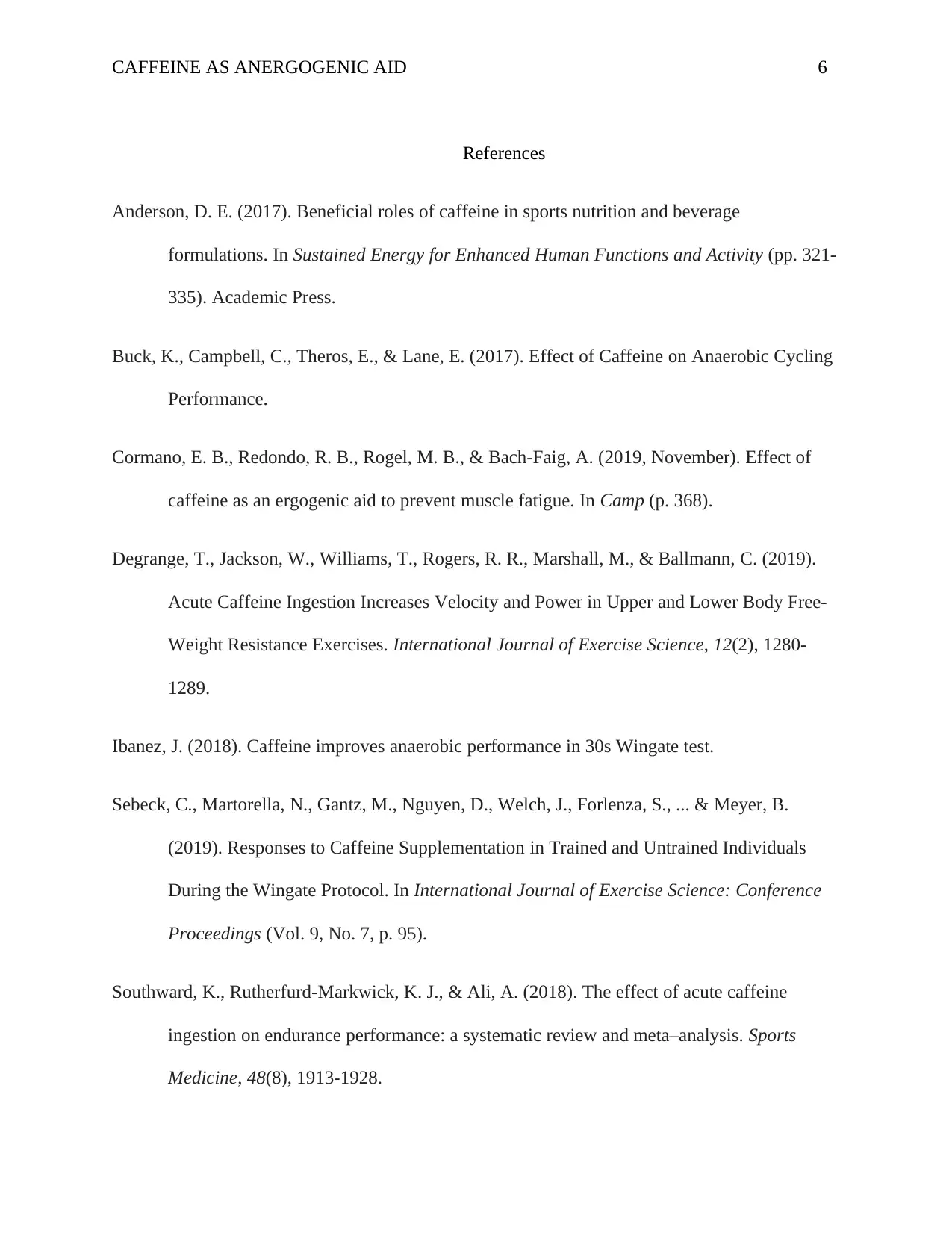
CAFFEINE AS ANERGOGENIC AID 6
References
Anderson, D. E. (2017). Beneficial roles of caffeine in sports nutrition and beverage
formulations. In Sustained Energy for Enhanced Human Functions and Activity (pp. 321-
335). Academic Press.
Buck, K., Campbell, C., Theros, E., & Lane, E. (2017). Effect of Caffeine on Anaerobic Cycling
Performance.
Cormano, E. B., Redondo, R. B., Rogel, M. B., & Bach-Faig, A. (2019, November). Effect of
caffeine as an ergogenic aid to prevent muscle fatigue. In Camp (p. 368).
Degrange, T., Jackson, W., Williams, T., Rogers, R. R., Marshall, M., & Ballmann, C. (2019).
Acute Caffeine Ingestion Increases Velocity and Power in Upper and Lower Body Free-
Weight Resistance Exercises. International Journal of Exercise Science, 12(2), 1280-
1289.
Ibanez, J. (2018). Caffeine improves anaerobic performance in 30s Wingate test.
Sebeck, C., Martorella, N., Gantz, M., Nguyen, D., Welch, J., Forlenza, S., ... & Meyer, B.
(2019). Responses to Caffeine Supplementation in Trained and Untrained Individuals
During the Wingate Protocol. In International Journal of Exercise Science: Conference
Proceedings (Vol. 9, No. 7, p. 95).
Southward, K., Rutherfurd-Markwick, K. J., & Ali, A. (2018). The effect of acute caffeine
ingestion on endurance performance: a systematic review and meta–analysis. Sports
Medicine, 48(8), 1913-1928.
References
Anderson, D. E. (2017). Beneficial roles of caffeine in sports nutrition and beverage
formulations. In Sustained Energy for Enhanced Human Functions and Activity (pp. 321-
335). Academic Press.
Buck, K., Campbell, C., Theros, E., & Lane, E. (2017). Effect of Caffeine on Anaerobic Cycling
Performance.
Cormano, E. B., Redondo, R. B., Rogel, M. B., & Bach-Faig, A. (2019, November). Effect of
caffeine as an ergogenic aid to prevent muscle fatigue. In Camp (p. 368).
Degrange, T., Jackson, W., Williams, T., Rogers, R. R., Marshall, M., & Ballmann, C. (2019).
Acute Caffeine Ingestion Increases Velocity and Power in Upper and Lower Body Free-
Weight Resistance Exercises. International Journal of Exercise Science, 12(2), 1280-
1289.
Ibanez, J. (2018). Caffeine improves anaerobic performance in 30s Wingate test.
Sebeck, C., Martorella, N., Gantz, M., Nguyen, D., Welch, J., Forlenza, S., ... & Meyer, B.
(2019). Responses to Caffeine Supplementation in Trained and Untrained Individuals
During the Wingate Protocol. In International Journal of Exercise Science: Conference
Proceedings (Vol. 9, No. 7, p. 95).
Southward, K., Rutherfurd-Markwick, K. J., & Ali, A. (2018). The effect of acute caffeine
ingestion on endurance performance: a systematic review and meta–analysis. Sports
Medicine, 48(8), 1913-1928.
⊘ This is a preview!⊘
Do you want full access?
Subscribe today to unlock all pages.

Trusted by 1+ million students worldwide
1 out of 6
Your All-in-One AI-Powered Toolkit for Academic Success.
+13062052269
info@desklib.com
Available 24*7 on WhatsApp / Email
![[object Object]](/_next/static/media/star-bottom.7253800d.svg)
Unlock your academic potential
Copyright © 2020–2026 A2Z Services. All Rights Reserved. Developed and managed by ZUCOL.